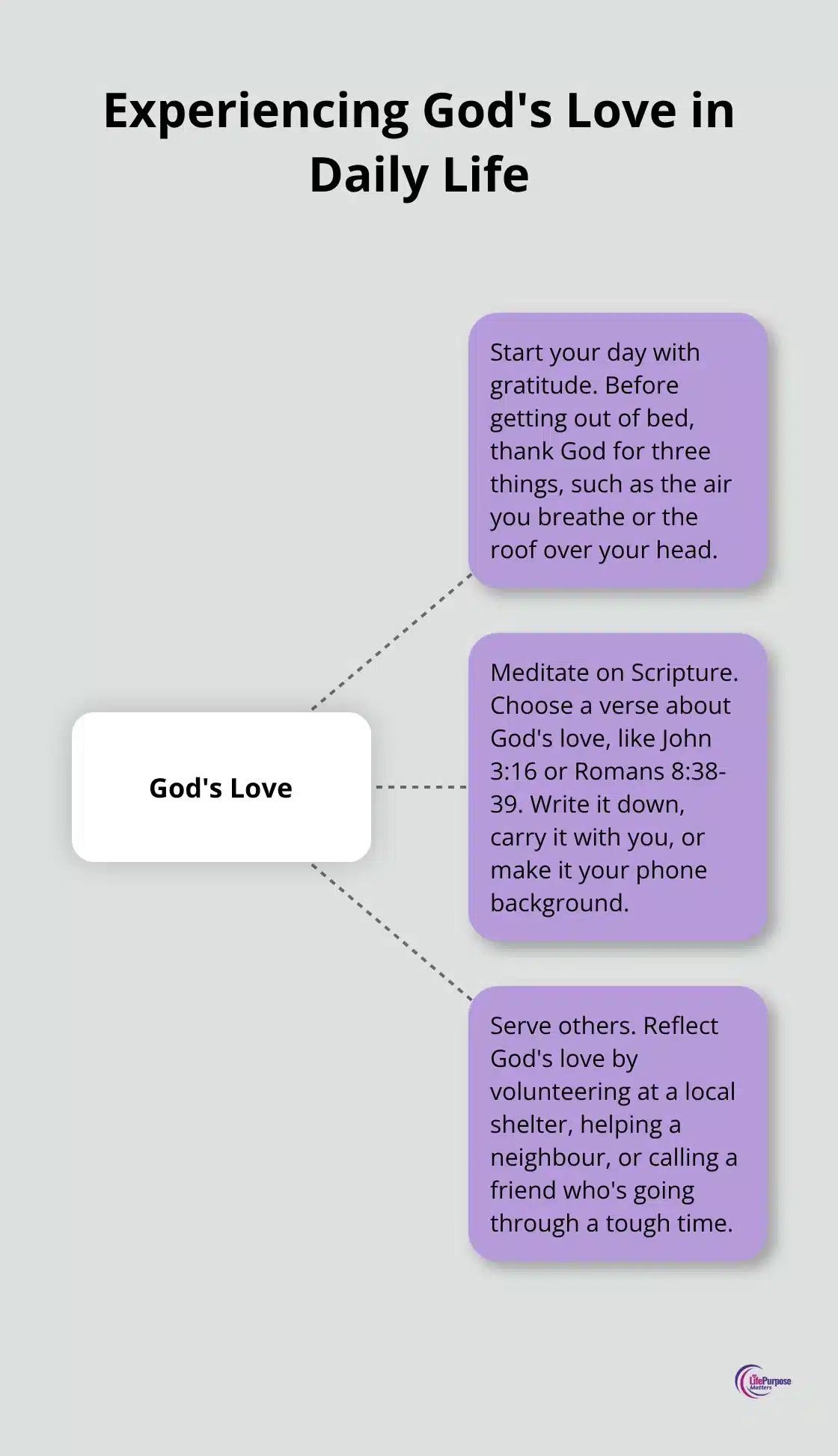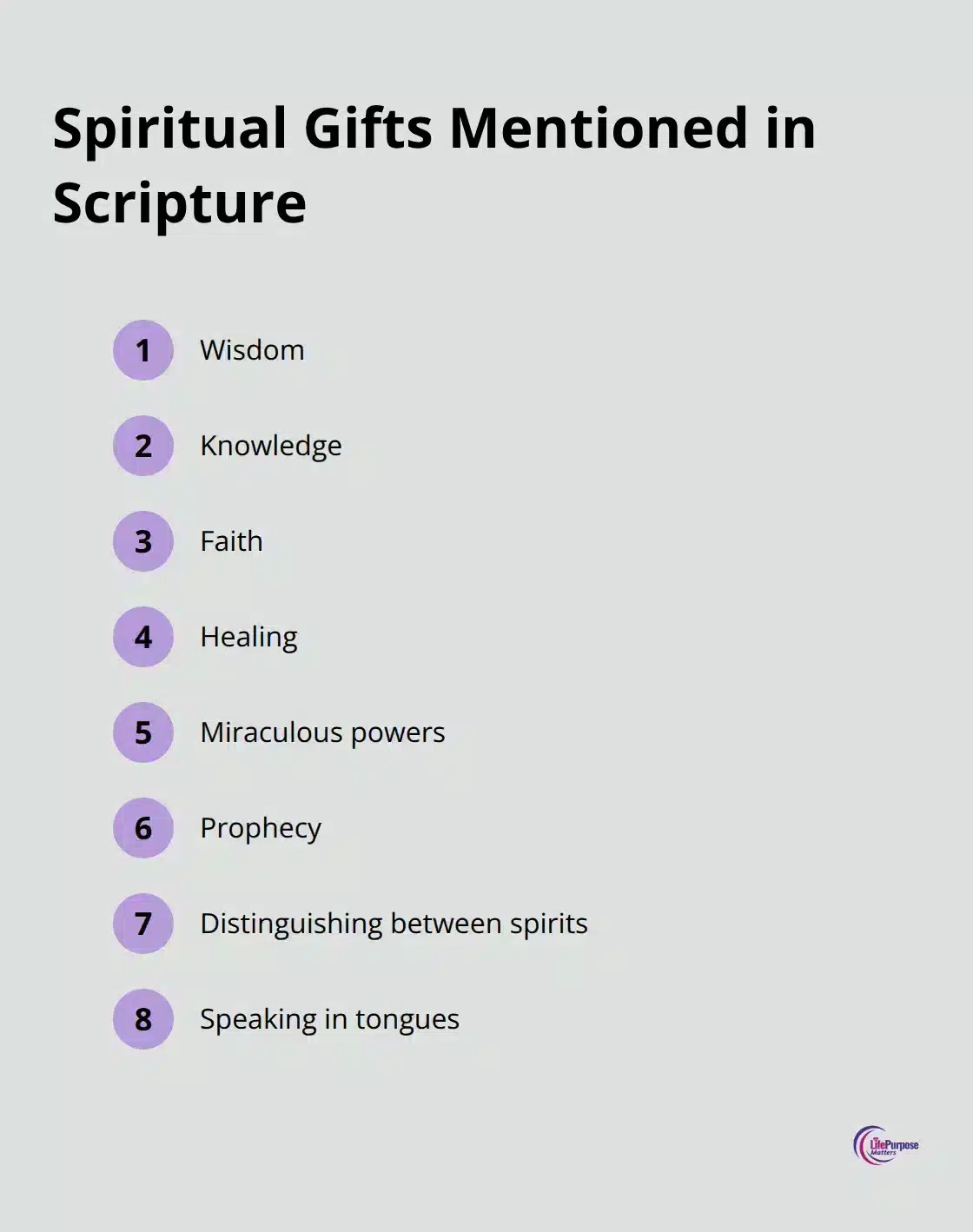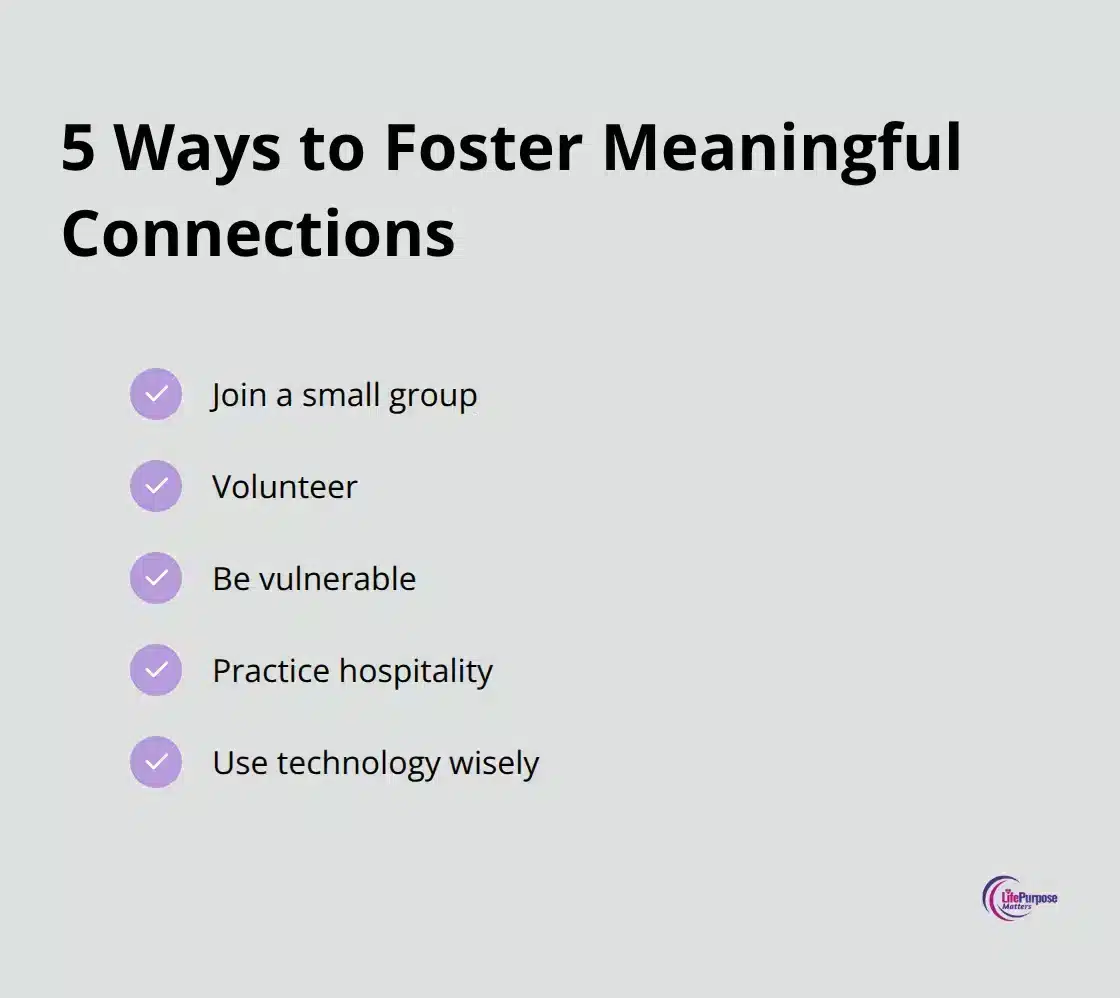Have you ever wondered about the meaning of life as a Christian? It’s a question that’s crossed my mind more times than I can count. At Life Purpose Matters, we believe that understanding our purpose through faith can transform our lives in profound ways. We likewise believe that from a Christian perspective, the meaning of life is rooted in God’s purpose for humanity: to know, love, and worship Him, and to love and serve others, reflecting His image and living in relationship with Him. Life’s purpose involves growth through experience, choosing good over evil, and finding redemption and a deeper relationship with God through Jesus Christ. Ultimately, this leads to a life characterised by love, joy, peace, and service, culminating in a relationship with God that continues beyond earthly life.
In this post, we’ll explore how God’s love, our unique gifts, and our relationships with others shape our Christian journey and give our lives deep, lasting meaning.
Table of Contents
ToggleHow God’s Love Shapes Our Purpose
At Life Purpose Matters, we often hear from people who struggle to find their purpose. But here’s the truth: understanding God’s love for us unlocks our true purpose in life.
Let’s get real for a moment. Have you ever felt like you’re not good enough? Like you constantly fall short? I’ve been there, and it’s not a great feeling. But here’s the amazing truth: God loves us unconditionally. Period. No ifs, ands, or buts about it.
God’s love shapes our purpose by transforming our identity, providing strength and hope, and inspiring us to love and serve others, leading to a life of joy, confidence, and faith. Experiencing His unconditional love breaks the chains of self-doubt, empowers us to embrace our God-given potential, and aligns our actions with His divine plan. This transformative love also calls us to serve, leading to a deeper connection with God and a more compassionate approach to the world around us.
God’s Love as Our Foundation
Think about it this way: God’s love for us doesn’t depend on our performance or achievements. It’s not about how many times we’ve read the Bible or how often we go to church. Central to this concept is the idea of agape, a Greek term denoting unconditional, sacrificial love that does not rely on personal gain or mutual affection. That’s powerful stuff!

Practical Ways to Experience God’s Love
- Start your day with gratitude. Before you even get out of bed, thank God for three things. It could be as simple as the air you breathe or the roof over your head.
- Meditate on Scripture. Pick a verse about God’s love (like John 3:16 or Romans 8:38-39) and let it sink in. Write it down, carry it with you, make it your phone background.
- Serve others. When we show love to others, we reflect God’s love. Volunteer at a local shelter, help a neighbour, or simply call a friend who’s going through a tough time.
Share God’s Love in Daily Life
Now, let’s talk about sharing that love. It’s not about preaching on street corners (unless that’s your thing). It’s about living in a way that reflects God’s love to others.
At work, be the person who lifts others up instead of tearing them down. In your relationships, practice forgiveness and grace. In your community, look for ways to meet needs and spread kindness.
Our purpose isn’t just about us. It’s about becoming a channel for God’s love in the world. When we truly grasp how much God loves us, it changes everything. Our identity becomes rooted in His love, not in our accomplishments or failures.
Embrace Your God-Given Identity
Here’s a challenge for you: Take some time this week to reflect on God’s love for you. Write down ways you’ve experienced His love in your life. Then, think about how you can share that love with others.
Understanding God’s love is the first step in living out your purpose. It’s not always easy, but it’s always worth it. As we dive deep into God’s love, we’ll see how it transforms our lives and the lives of those around us.
Now that we’ve explored how God’s love shapes our purpose, let’s turn our attention to another crucial aspect of our Christian journey: the unique talents and gifts God has given each of us. How can we identify and use these gifts to further His kingdom?
Living Out Our God-Given Talents and Gifts
Have you ever felt unsure about your unique abilities? You’re not alone. Many people struggle to identify their special talents. But here’s the truth: God has blessed each of us with unique gifts, and it’s our responsibility to uncover and use them to serve others.
Uncovering Your Spiritual Gifts
To identify your spiritual gifts, consider taking a spiritual gifts assessment. These tests can provide insights into your natural abilities and how they align with biblical teachings. The Apostle Paul describes a variety of gifts, such as wisdom, knowledge, faith, healing, miraculous powers, prophecy, distinguishing between spirits, and speaking in tongues.

Another effective approach involves asking those closest to you. Your friends, family, and church community often recognise strengths in you that you might overlook. Don’t hesitate to reach out and ask for their perspective.
Putting Your Talents to Work
After you’ve identified your gifts, it’s time to put them into action. If you’ve discovered a gift for teaching, consider volunteering to lead a Bible study or Sunday school class. If you excel at hospitality, host a small group or organise church events.
Remember, using your talents extends beyond church activities. You can glorify God in your everyday life too. This begins with a simple prayer, inviting God into your work and asking the Holy Spirit to help you honour Him in all that you do. If you’re great with numbers, offer to help someone with their budget. If you’re a skilled writer, start a blog sharing your faith journey.
Overcoming Roadblocks
Let’s be honest – pursuing your calling isn’t always easy. You might face self-doubt, fear of failure, or even criticism from others. But here’s an important truth: God doesn’t call the equipped, He equips the called.
If you feel stuck, try this: Set small, achievable goals related to your talents. If public speaking terrifies you but you feel called to preach, start by sharing your testimony with a close friend. Small steps lead to big victories.
The power of prayer and community support cannot be overstated. Surround yourself with people who believe in you and your God-given purpose. Always turn to God for guidance and strength.
Using your talents isn’t about becoming famous or successful in worldly terms. It’s about serving others and bringing glory to God. Take that first step today. Identify your gifts, find ways to use them, and watch how God works through you to impact the world around you.
As we explore how to live out our God-given talents and gifts, it’s important to remember that we don’t walk this journey alone. Our relationships with others play a crucial role in our spiritual growth and purpose. Let’s now turn our attention to the importance of building meaningful relationships in Christ.
Building Meaningful Relationships in Christ
At Life Purpose Matters, we often emphasise that our faith journey isn’t meant to be a solo adventure. God designed us for community, and building meaningful relationships with fellow believers is essential for our spiritual growth and overall well-being. Through the Holy Spirit’s gift of love, diverse members of a Christian community become a blessing to each other, helping each other to spiritually grow.
The Power of Christian Fellowship
True Christian community goes beyond casual interactions. It involves deep, authentic relationships where we can share our joys, struggles, and faith journey with others who understand and support us.
Practical Steps to Foster Meaningful Connections

- Join a small group: Many churches offer small group programmes where you can connect with others in a more intimate setting. These groups encourage people to explore the Bible and their faith together, while also building strong relationships with one another.
- Volunteer: Serve alongside others to build relationships while making a difference. Look for opportunities within your church or local Christian organisations.
- Be vulnerable: Open up about your struggles and challenges. This invites others to do the same, creating deeper, more authentic connections.
- Practice hospitality: Invite people from your church or Christian community over for meals or coffee. Create a welcoming environment in your home to foster deeper relationships.
- Use technology wisely: While face-to-face interactions are ideal, tools like video calls and Christian social media platforms can help you stay connected with your faith community (especially when physical meetings aren’t possible).
Balancing Personal Faith and Community Worship
While community is essential, it’s equally important to nurture your personal relationship with God. Here are some ways to strike a balance:
- Set aside daily quiet time: Dedicate time each day for personal prayer, Bible study, and reflection.
- Participate in corporate worship: Attend church services regularly to join in communal praise and learning.
- Serve others: Use your gifts to contribute to your faith community, which can deepen both your personal faith and your connections with others.
- Seek accountability: Find a trusted friend or Christian mentor who can encourage you in your faith walk and hold you accountable to your spiritual goals.
- Attend retreats or conferences: These events can provide opportunities for both personal growth and community building.
Building meaningful relationships in Christ takes time, effort, and sometimes stepping out of your comfort zone. The rewards – deeper faith, stronger support systems, and a sense of belonging – are well worth it.
Final Thoughts
The meaning of life as a Christian centres on God’s love, our unique gifts, and meaningful relationships. God’s unconditional love forms the foundation of our purpose, shaping our identity and actions. Our spiritual gifts serve others and glorify God, while Christian community nurtures our faith and supports our growth.
Living out your Christian purpose starts with daily gratitude and reflection on your talents. Reach out to someone in your faith community and schedule a coffee date or Bible study session. Patience is key in this journey (spiritual growth takes time).
At Life Purpose Matters, we support you in discovering and living out your God-given purpose. We offer resources to inspire and guide you as you deepen your faith. You are uniquely created by God, with a specific purpose only you can fulfil.

